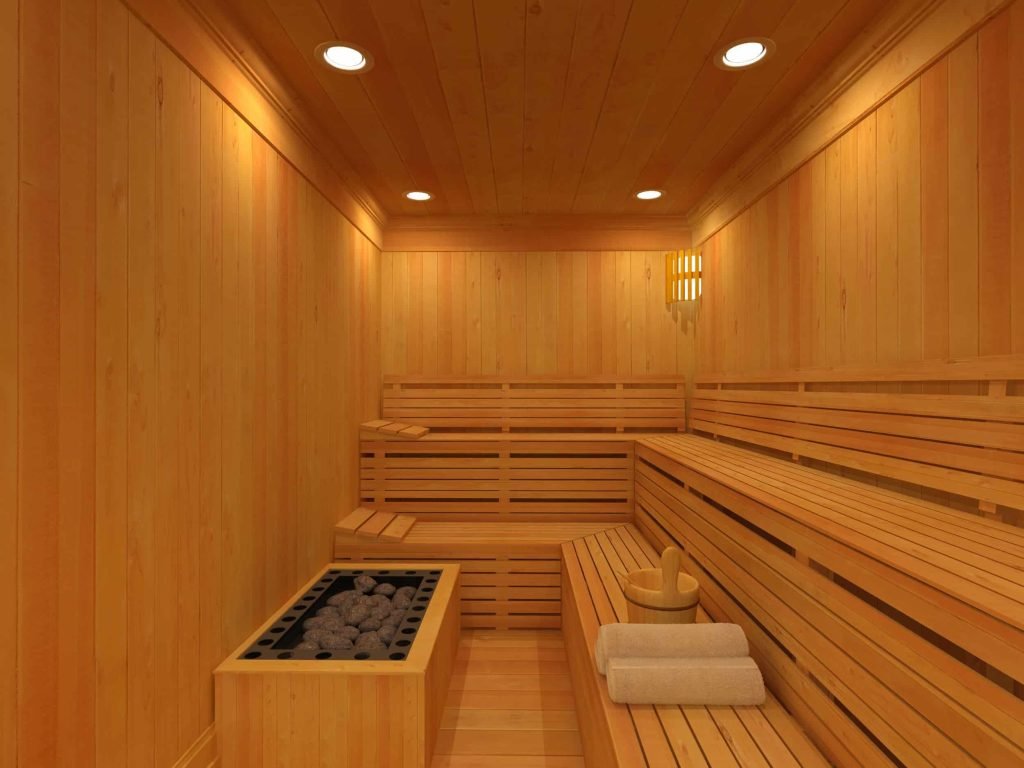Saunas are a part of many centuries-old traditions, such as Turkish baths, Russian banyas, and Native American sweat lodges. In Finland, where saunas are a popular cultural tradition, there are two million saunas with various sauna benefits for every five million residents. Traditionally, a sauna is a heated, wood-paneled room with an average temperature of 176°F to 212°F (80°C to 100°C).
You may also add more humidity to the sauna by sprinkling water over heated rocks. With less than 20% humidity, it is often significantly drier than a steam chamber. Furthermore, a more modern kind of sauna that is becoming more and more popular is the infrared sauna. They employ infrared radiation to heat the body directly, thus they can operate at lower temperatures (122°F to 149°F, or 50°C to 65°C).
You already know how hot the interior of a sauna can become if you’ve ever used one. Your heart starts to beat, your skin becomes sticky, and you could even feel as if you’re exercising without really moving. Like exercise, a wealth of research suggests that regular sauna use provides long-term health benefits. Most people find that sauna use is safe and may have benefits for their heart and mental health in addition to relaxing.
Why One Should Have Sauna

1. Cardiovascular Health
One of the most well-documented sauna benefits is its positive effect on cardiovascular health. Regular sauna sessions can lead to improved circulation, reduced blood pressure, and a lower risk of cardiovascular disease.
Improved Circulation: The heat from the sauna causes the body’s core temperature to rise, prompting blood vessels to dilate. This vasodilation leads to increased blood flow, particularly to the skin, which helps deliver oxygen and nutrients to various tissues more efficiently.
Lower Blood Pressure: Regular sauna use has been shown to lower both systolic and diastolic blood pressure. This reduction in blood pressure is thought to be due to the heat-induced relaxation of blood vessels and the subsequent reduction in peripheral resistance.
Reduced Risk of Cardiovascular Disease: Long-term studies have demonstrated that frequent sauna use is associated with a reduced risk of cardiovascular diseases, including heart attack and stroke. This is likely due to the combined effects of improved circulation, lower blood pressure, and the overall relaxation response that saunas induce.
2. Enhanced Detoxification
Sweating is one of the body’s primary mechanisms for eliminating toxins, and saunas provide an excellent environment for promoting this process. When you sweat in a sauna, your body can expel a variety of toxins, including heavy metals, chemicals, and other impurities.
Heavy Metal Detox: Studies have shown that sweating can help eliminate heavy metals such as lead, mercury, and arsenic from the body. These metals can accumulate over time and contribute to various health problems, so regular sauna use can be a valuable tool for detoxification.
Elimination of Chemicals: Modern living exposes us to a variety of synthetic chemicals, including bisphenol A (BPA) and phthalates. Saunas can help the body rid itself of these chemicals through the skin, reducing the toxic load on organs such as the liver and kidneys.
Skin Health: In addition to removing toxins, the increased blood flow to the skin during a sauna session helps to nourish skin cells and promote a healthy, glowing complexion. Regular sauna use can also help with skin conditions such as acne by unclogging pores and removing impurities.
3. Improved Immune System Function
One of the sauna health benefits is that regular sauna sessions can boost the immune system, making the body more resilient to infections and illnesses. The heat from the sauna mimics the effects of a fever, which is the body’s natural response to fighting off infections.
Increased Production of White Blood Cells: The elevated temperature in a sauna stimulates the production of white blood cells, which are crucial for the immune system’s ability to fight off pathogens. An increase in white blood cell count helps the body respond more effectively to infections.
Enhanced Stress Response: The heat stress induced by a sauna session activates the body’s heat shock proteins. These proteins play a role in protecting cells from damage and supporting the immune system’s function.
Reduction in Common Cold Incidence: Studies have indicated that regular sauna users experience fewer colds compared to those who do not use saunas. This effect is likely due to the overall strengthening of the immune system and the enhanced ability to ward off viruses.
4. Muscle Recovery and Pain Relief
Saunas are widely recognized for their ability to aid in muscle recovery and alleviate pain. The heat from the sauna promotes blood flow to muscles, which can help reduce muscle soreness and accelerate the healing process after exercise.
Reduction of Muscle Soreness: The increased blood flow to muscles during a sauna session helps to deliver oxygen and nutrients, which are essential for muscle repair. This can lead to a reduction in delayed onset muscle soreness (DOMS) after intense physical activity.
Pain Relief for Chronic Conditions: Saunas are beneficial for individuals suffering from chronic pain conditions such as arthritis and fibromyalgia. The heat helps to relax muscles and joints, providing temporary pain relief and improving mobility.
Increased Flexibility: Regular sauna use can also improve joint flexibility by warming up the muscles and connective tissues. This is particularly beneficial for athletes and individuals who engage in regular physical activity, as it can reduce the risk of injury.
5. Mental Health and Stress Reduction
The mental health sauna benefits are often overlooked, but they can be profound. Regular sauna use can help reduce stress, alleviate symptoms of anxiety and depression, and promote overall mental well-being.
Stress Reduction: The heat and relaxation provided by a sauna session trigger the release of endorphins, the body’s natural “feel-good” hormones. This endorphin release can help reduce stress levels and promote a sense of calm and relaxation.
Alleviation of Anxiety and Depression: Some studies have suggested that sauna use can have a positive effect on symptoms of anxiety and depression. The combination of physical relaxation and the release of endorphins may contribute to an improved mood and a reduction in the severity of these conditions.
Enhanced Sleep Quality: Regular sauna sessions have been shown to improve sleep quality, which is crucial for mental health. The relaxation response induced by sauna use can help individuals fall asleep more easily and enjoy deeper, more restorative sleep.
6. Weight Loss and Metabolism Boost
Saunas can be a valuable tool for those looking to lose weight and improve their metabolic health. While the weight loss effects of saunas are not a substitute for a healthy diet and exercise, they can complement these efforts.
Increased Caloric Burn: The heat from the sauna increases the body’s core temperature, which in turn raises the metabolic rate. This increase in metabolism leads to a higher caloric burn during and after the sauna session.
Water Weight Loss: Saunas promote sweating, which can lead to the loss of excess water weight. While this is not a permanent form of weight loss, it can be beneficial for reducing bloating and water retention.
Improved Insulin Sensitivity: Some studies have suggested that regular sauna use can improve insulin sensitivity, which is important for maintaining healthy blood sugar levels and preventing type 2 diabetes.
7. Respiratory Health
Saunas can have a positive impact on respiratory health, particularly for individuals suffering from conditions such as asthma, bronchitis, and sinus congestion. The sauna health benefits are that the heat and humidity of a sauna can help to open up the airways and improve breathing.
Reduction in Respiratory Symptoms: The warm, moist air in a sauna can help to soothe irritated airways and reduce symptoms of respiratory conditions. This is particularly beneficial for individuals with asthma or chronic bronchitis.
Improved Lung Function: Regular sauna use has been shown to improve lung function, particularly in individuals with respiratory conditions. The heat helps to dilate the airways, making it easier to breathe and allowing for better oxygen exchange.
Clearing of Sinus Congestion: The humidity in a sauna can help to relieve sinus congestion by loosening mucus and promoting drainage. This can be particularly beneficial during the cold and flu season or for individuals suffering from allergies.
8. Skin Health and Anti-Aging Benefits
Saunas are not only beneficial for detoxification and relaxation but also for maintaining healthy, youthful-looking skin. The increased blood flow and sweating during a sauna session can lead to a range of skin health benefits.
Deep Cleansing of the Skin: The heat and sweating in a sauna help to open up pores and remove dirt, oil, and other impurities from the skin. This deep cleansing can lead to clearer skin and a reduction in acne.
Increased Collagen Production: The increased blood flow to the skin during a sauna session can stimulate collagen production, which is essential for maintaining skin elasticity and reducing the appearance of wrinkles.
Reduction in Inflammation: Regular sauna use has been shown to reduce inflammation in the skin, which can help with conditions such as eczema and psoriasis. The heat can also help to soothe irritated skin and promote healing.
9. Longevity and Quality of Life
The cumulative effects of regular sauna use can contribute to increased longevity and an overall improvement in the quality of life. The combination of cardiovascular benefits, immune system support, stress reduction, and other health benefits can lead to a longer, healthier life.
Reduced Risk of Premature Death: Long-term studies have shown that regular sauna users have a reduced risk of premature death from all causes, including cardiovascular disease, cancer, and respiratory conditions.
Improved Quality of Life: The relaxation, improved mental health, and physical benefits of saunas can contribute to a better quality of life. Regular sauna use can help individuals feel more relaxed, energized, and in control of their health.
Promotion of Healthy Aging: The anti-aging benefits of saunas, including improved skin health, reduced inflammation, and increased longevity, can help individuals age gracefully and maintain their health and vitality as they grow older.
Types of Saunas
Saunas come in a variety of forms and several sauna benefits, such as the following:
Wood-burning saunas: These outdoor, standalone saunas utilize wood as fuel to raise the temperature of the space. They could have a wood-burning stove within the building or a place underneath it where a fire is utilized to heat the room.
Electrically heated saunas: These saunas usually contain a tiny heater with pebbles resting on top. Users can splash water on the rocks when they get hot to provide humidity in the room. Finnish, or traditional, saunas are those that burn wood and utilize electricity to heat.
Infrared saunas: Far-infrared saunas (FIRS) produce radiant heat via the employment of light rays that are absorbed by the body directly rather than heating the surrounding air. Warming the body from the inside out, infrared heat enters the body more deeply than regular sauna heat. The duration of a session might range from 20 to 60 minutes.
Steam saunas: team rooms, often known as wet saunas, employ a steam generator to provide moist heat. They employ less heat and greater humidity than conventional saunas, which speeds up the sweating process.
FAQ
Q: Sauna therapy: what is it?
A: The Scandinavian term “sauna” refers to an age-old method of dry heat treatment that has been used by several civilizations in Europe, Asia, Africa, Central America, and North America.
Q: Are dry saunas beneficial for you?
A: Using a dry sauna might leave individuals feeling energetic. Since the blood vessels relax and widen in a sauna, blood flow rises, and the experience may help alleviate stress in the joints and soothe painful muscles. Saunas could also benefit patients with chronic pain and arthritis.
Q: What is a sauna’s primary function?
A: Sauna facilities frequently list detoxification, enhanced metabolism, weight loss, increased blood flow, pain relief, anti-aging, skin rejuvenation, enhanced cardiovascular function, enhanced immune system, enhanced sleep, stress reduction, and relaxation among their health advantages.










